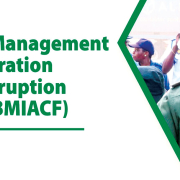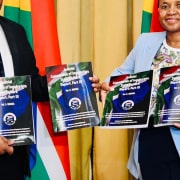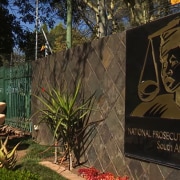|
Getting your Trinity Audio player ready...
|
By Moepeng Valencia Talane – CW Voices
There has been a mixture of reactions to a recent report in the Sunday Times in which ANC secretary-general Fikile Mbalula told the newspaper that the disbandment of the Scorpions anti-corruption unit in 2009 was a mistake. He is quoted as acknowledging his party’s position on the disbandment, and being one of the proponents of the unit’s demise.
“We were very big critics of the Scorpions, about the way to arrest [sic]. But from a quality point of view criminals knew that (when you were) surrounded by the Scorpions, it’s game over,” he is quoted as saying.
Some of those who have responded to Mbalula have taken the view that if the ANC really wants the Scorpions back, it could very well bring it back. After all, the disbandment of the Scorpions was a party decision that Mbalula himself took active part in a member of its national executive council. The decision was pushed through Parliament to serve the ANC’s interests, as it was the party’s politically influential and powerful that were in its sights.
“From the point of the ANC, we will direct government to move into that gear now in terms of resourcing, and at the same time upgrading the skills levels of our elite police group that fight organised crime,” Mbalula said.
“Scrapping the Scorpions had ‘watered down’ law enforcement and really weakened the capacity of the state to respond, not to petty issues but to seriously complicated issues,” the Sunday Times reported.
Mbalula has not come back to claim misattribution by the Sunday Times, so we will take the newspaper’s word for it, and watch what happens from here on. We will not hold our collective breath, though, because his pronouncement could well be another blurring of the lines between political will and fortitude and cheap electioneering, considering that we are heading to the polls again next year.
A more proactive ANC could have spared SA much trauma
What is worth noting in the meantime, though, is that his very valid points on the absence of the Scorpions not being ideal, are echoed by many in South Africa who have watched the trajectory of corruption soar over the years. The difference between us and Mbalula is that his words hold weight, coming from a man who occupies one of the most powerful political offices in the country, so indeed if he and his fellow comrades wanted to bring back the big shot in the arm of anti-corruption that the Scorpions was, they very obviously could make it happen.
Certainly his concession comes at a time when we are constantly reassured by the Ramaphosa administration that government is still on track in its anti-corruption efforts, laying the necessary foundations for systems of accountability, with changes to several pieces of legislation and the establishment of the National Anti-Corruption Advisory Council, among other measures. But the punch of visual accountability in the form of viable prosecutions is still missing.
Had Mbalula’s views been made sooner by the ANC’s leadership, with an accompanying bold intention to make genuine strides to bring back the Scorpions, South Africa would have been spared a lot of trauma brought on by debilitating corruption across multiple sectors.
The country could have also saved a lot of money in expensive commissions, litigation, and investigations that despite the best intentions and resources put behind them, did not always enjoy positive political responses.
A few of these come to mind, including the recent Zondo commission, and before it the Seriti, Nugent, Cassim, and Marikana commissions, as well as the one probing the affairs of the PIC. Their collective bill adds up to billions of rands, and they have delivered partially on holding those accused of corruption, state capture and abuse of power accountable, but not without political distractions and interference.
Independent – or were they?
As relatively recently as 2020, ANC stalwarts and former cabinet minister Yunus Carrim offered a well-considered, elaborative opinion piece detailing how nuanced the process of disbandment had been. He argues that the approach from the party was not simply one of a sheep mentality, but rather it considered the pros and cons of letting go of such a unit.
The Scorpions – or as they were known by their official name, the Directorate for Special Operations – were a visible irritation to the political elite in a country that needed to decisively act against corruption and abuse of power at the time.
They were dissolved just over a year after former president Jacob Zuma was elected to the ANC’s most prestigious position in December 2007, at a conference that resolved to get rid of them. Unlike the current Directorate for Priority Crimes Investigations, or the Hawks as they are colloquially known, the Scorpions fell under the National Prosecuting Authority (NPA) and combined investigations and prosecutions in high profile cases that over time profiled several ANC politicians in a bad light.
During the era of the Scorpions, the country’s then deputy president (Zuma), its national police commissioner (Jackie Selebi) and members of Parliament Winnie Madikizela-Mandela, Bathabile Dlamini, and Tony Yengeni came under its scrutiny and were investigated and prosecuted for a variety of crimes.
It is no wonder then that the narrative that has carried over the years has been that the unit’s independence and insistence on impartiality is what led to its demise. An opposing narrative is that the independence of the Scorpions was questionable, and it only went after the people that it did because it served on the whim of the dominant faction of the ANC during its term.
Don’t hold your breath
A Business Day editorial in October last year cited Ramaphosa’s response plan to the Zondo commission’s findings and recommendations as hinting towards a subtle reinstatement of the Scorpions. The president announced then that because the law enforcement sector needed support in implementing a lot of the investigative and prosecutorial mandates in the recommendations, he had decided to make the Independent Directorate (ID) a permanent feature of the NPA.
“The question now is whether Ramaphosa’s move to upgrade the ID will stem the tide of rent-seeking. This is debatable, since it’s unclear whether the ANC supports such a move. Already, people such as [then] ANC presidential hopeful Zweli Mkhize are talking about repealing the party’s step aside rule,” the editorial noted.
The rise, fall, and possible rise again of the Scorpions – in whatever form it happens, if it ever happens – circles back to a party that cares more about those who rank high in its power stables than the public it wants to vote for it in 2024.
Its secretary-general used the opportunity of a newspaper interview to reignite the anti-corruption rhetoric that helped his party president gain victory over Zuma in 2017.









Leave a Reply